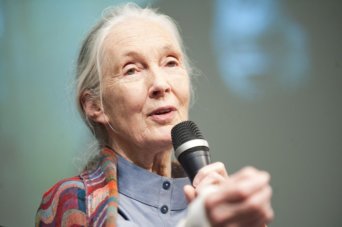- About
- Topics
- Picks
- Audio
- Story
- In-Depth
- Opinion
- News
- Donate
- Signup for our newsletterOur Editors' Best Picks.Send
Read, Debate: Engage.
Jane Goodall became first known through her studies on our close relatives, the chimpanzees, by discovering their unexpected ability to use tools to pursue individual goals. Our human race has developed exactly this kind of competence, leading to unprecedented capabilities to improve our life on this planet. Yet, with immeasurable consequences on nature and our habitat, including all its natural residents and resources.
The era of technology and industrialization combine our scientific and organizational capabilities to what is commonly considered as progress. And, while we are still questioning scientific findings on reasons of the changing climate, and the ruthless exploitation of our natural resources, its consequences already became a reality.
Millions of climate refugees, the exponential extinction of species and the abuse of our natural resources are telling that dystopian scenarios of our future are not just knocking at our door, but they have already entered our live - ticking like a time bomb.
When UN Messenger of Peace, and author of a book titled "Reason For Hope", Jane Goodall was recently asked by the New York Times whether the Earth would be a better or worse place by 2050 her answer wasn't driven by much hope it seems:
"I see the world in 50 years, perhaps 100, as a dark place."
Goodall pointed out three predictions being caused by human behavior:
First, "environmental refugees will have fled their destroyed homelands, flooded by the rising seas or buried by the encroaching deserts. Many people will be starving as they fight for access to water and land."
Second, "medical science will be unable to cope with new infections, as bacteria build up resistance to more and more antibiotics and the tropical forests where so many medical cures are sourced are destroyed."
And, third, "the destruction of the rainforest, losing each year a chunk of rainforest the size of Panama to deforestation. The loss of these lush forests won't just affect the animals and plants who live there or the people who live in their immediate vicinity. We get a large portion of our medicines, including the drugs we use to fight deadly diseases like cancer, from the rainforest."
The terrifying thing about Goodall's vision isn't "how dystopian it sounds, but rather how prescient it's already proven to be," reports the Business Insider.
The huge challenge seems to be that we won't get away by just developing better tools as chimpanzees do, because as Albert Einstein said, "we can't solve problems by using the same kind of thinking we used when we created them."
In fact we need to develop our minds and move into a new era that cultivates collective intelligence and ethical orientation based on respect and care for nature. We need to define a new role for humans on this planet.
Again, Einstein's take on this was to demand "a substantially new manner of thinking if mankind is to survive.”
